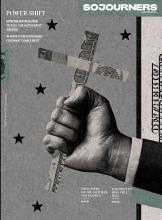Share As A Gift
Share a paywall-free link to this article.
This feature is only available for subscribers.
Start your subscription for as low as $4.95. Already a subscriber?

Illustration by Mark Harris
IN NOVEMBER, THE United States joined Argentina (Javier Milei), India (Narendra Modi), and Hungary (Viktor Orbán), among other countries, when it elected an authoritarian as its chief executive. In the case of Donald J. Trump, examples of these far-right tendencies include plans for mass deportations, promises to replace nonpartisan government employees with loyalists, and threats to put political critics on trial.
How did we get here? And what do we need to know to mitigate harm, save what and who we can, and work toward a more free and equitable future? Some of us may feel weary and defeated, but journalist Katherine Stewart, who has investigated the authoritarian movement for more than 15 years, encourages curiosity: “We can’t address our problems unless we know what they are.” Those problems include “decades of investment in a larger anti-democratic movement that would not have dissolved even if they had been defeated at the ballot box in this election cycle.”
In her forthcoming book, Money, Lies, and God: Inside the Movement to Destroy American Democracy, Stewart explores a network of strange bedfellows who drive a broad authoritarian movement both in the United States and abroad. The players in this network have different motivations: Ultra-rich funders aim to destroy the regulatory state to gain even more wealth, funneling resources to groups that further their aims. “New Right” academics and proto-academics pursue the ascendance of their pet ideologies. Veteran political operatives find new partners in the hunt for power.
Though many of the funders and power players within this movement are not Christian or even religious, Christian symbols, pastors, and churches have played a key role. Christian leaders — white evangelicals, but also conservative Catholics, Pentecostals, and others — and the warped theologies they peddle have helped convince voters that we are in a state of emergency. As evidence, these Christians baptize anxieties about sexuality and gender, the economy, and shifting demographics as evidence that America has lost its way and needs to be saved by a strongman.
Stewart’s other books include The Good News Club: The Christian Right’s Stealth Assault on America’s Children (2012) and The Power Worshippers: Inside the Dangerous Rise of Religious Nationalism (2020), which was the basis for the 2024 documentary God & Country. Stewart spoke with Sojourners editor Julie Polter before and after the November 2024 U.S. election. This interview has been edited for length and clarity.

Got something to say about what you're reading? We value your feedback!